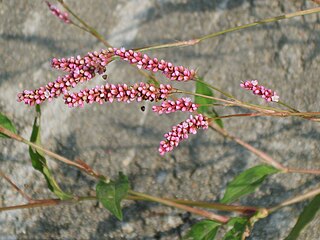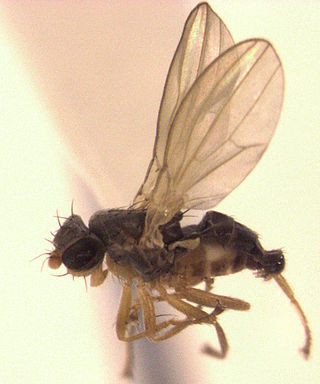
Meesia triquetra, the three-ranked hump-moss, is a moss that occurs all around the northern hemisphere in higher latitudes.
Pestalotia longiseta is a plant pathogen infecting tea.

Meesia uliginosa, the broad-nerved hump-moss, is a rare moss of the Western U.S. It occurs all around the northern hemisphere in higher latitudes, and in some places is not as rare as in the Western U.S.
Bactris longiseta, the huiscoyol, is a species of flowering plant in the family Arecaceae. It is found in Costa Rica and Nicaragua around Estero Real Natural Reserve. It is threatened by habitat loss.

A graminivore is a herbivorous animal that feeds primarily on grass, specifically "true" grasses, plants of the family Poaceae. Graminivory is a form of grazing. These herbivorous animals have digestive systems that are adapted to digest large amounts of cellulose, which is abundant in fibrous plant matter and more difficult to break down for many other animals. As such, they have specialized enzymes to aid in digestion and in some cases symbiotic bacteria that live in their digestive track and "assist" with the digestive process through fermentation as the matter travels through the intestines.
Trypeta longiseta is a species of tephritid or fruit flies in the genus Trypeta of the family Tephritidae.
Tricholaena is a genus of Asian, African, and Italian plants in the grass family.

Persicaria longiseta is a species of flowering plant in the knotweed family known by the common names Oriental lady's thumb, bristly lady's thumb, Asiatic smartweed, long-bristled smartweed, low smartweed, Asiatic waterpepper, bristled knotweed, bunchy knotweed, and tufted knotweed. It is native to Asia, and it is present in North America and Europe as an introduced species and often a weed.
Longitarsus longiseta is a species of beetle in the subfamily Galerucinae that can be found everywhere in European countries such as Austria, the Baltic states, Benelux, Great Britain, Germany, Hungary, Italy, Liechtenstein, Poland, Romania, Russia, Slovakia, Slovenia, Spain, Switzerland, and Scandinavia.

Australimyzidae is a family of flies (Diptera). There is 1 genus, containing 9 known species known from Australia and New Zealand and subantarctic surrounding islands. They have saprophagous larvae.
Metachorista longiseta is a species of moth of the family Tortricidae first described by Józef Razowski in 2013. It is found on Seram Island in Indonesia.

Persicaria glabra is a species of flowering plant native to North America and Eurasia.
Cepheia is a monotypic genus of European araneomorph spiders in the family Synaphridae containing the single species, Cepheia longiseta. It was first described as Theonoe longiseta in 1881, and was moved to its own genus in 1894. Originally placed with the tangle-web spiders, it was moved several times before settling in the Synaphridae in 2003. Paolo Brignoli noted that it is an unidentifiable theridiid.
Porphyrochroa longiseta is a species of dance fly in the family Empididae.

Meesia is a genus of mosses belonging to the family Meesiaceae. The genus has cosmopolitan distribution.

Meesiaceae is a family of mosses belonging to the order Splachnales.

Dawsonia longiseta is a species of moss in the family Polytrichaceae endemic to eastern Australia.
JaMeesia Ford is an American track and field athlete who competes as a sprinter. In March 2024, she became the NCAA 200 metres indoor champion. She is also the American national under-20 indoor record holder over 200 metres and is world under-20 record holder over 300 metres.








